牛津译林版英语七上unit6 study skllsand task 公开课课件
译林牛津版七年级英语上 unit 6 公开课教学课件
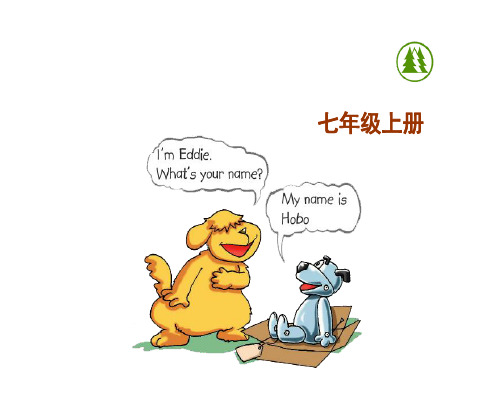
谢谢观看
students. 李老师对我们学生非常好。 The son is not good / bad to his old
parents. 那个儿子对他年老的父母不好。
be good at
be good at 表示“擅长于某一学科知识或技 能”,也可表示“在……方面做得好。” be good at 后面接名词、代词、动词的 -
love
like
dislike
hate
rice hamburgers
What’s your favorite food?
love
like
dislike
hate
chicken fish
What’s your favorite food?
love
like
dislike
hatevLeabharlann getablescakes
Listen and read.
M: I like bananas. How about you, Daniel? D: I like hamburgers. M: Do you like carrots? They are my
favourite. D: No, I don’t like them. Do you like fish? M: Yes. It is good for our health. I don’t
Eddie’s feeling
hungry
Eddie’s lunch
How many apple Eddie want to eat ?
hamburgers ten
Listen to the comic strip again and do the true or false questions.
牛津译林版英语七年级上册U6Studyskills教案
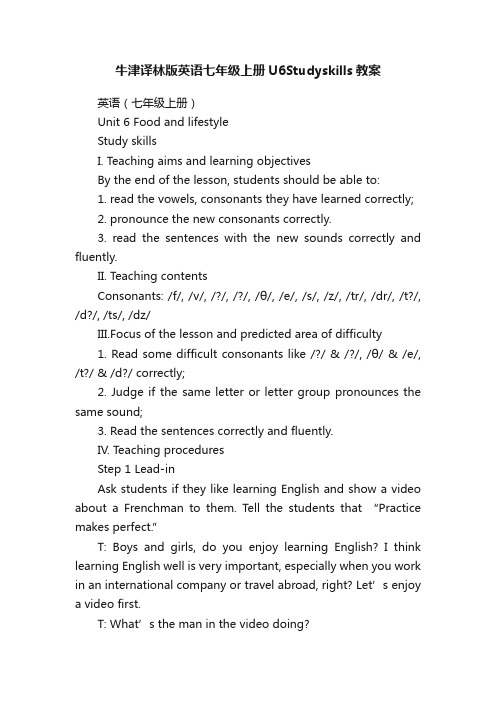
牛津译林版英语七年级上册U6Studyskills教案英语(七年级上册)Unit 6 Food and lifestyleStudy skillsI. Teaching aims and learning objectivesBy the end of the lesson, students should be able to:1. read the vowels, consonants they have learned correctly;2. pronounce the new consonants correctly.3. read the sentences with the new sounds correctly and fluently.II. Teaching contentsConsonants: /f/, /v/, /?/, /?/, /θ/, /e/, /s/, /z/, /tr/, /dr/, /t?/, /d?/, /ts/, /dz/III.Focus of the lesson and predicted area of difficulty1. Read some difficult consonants like /?/ & /?/, /θ/ & /e/, /t?/ & /d?/ correctly;2. Judge if the same letter or letter group pronounces the same sound;3. Read the sentences correctly and fluently.IV. Teaching proceduresStep 1 Lead-inAsk students if they like learning English and show a video about a Frenchman to them. Tell the students that “Practice makes perfect.”T: Boys and girls, do you enjoy learning English? I think learning English well is very important, especially when you work in an international company or travel abroad, right? Let’s enjoy a video first.T: What’s the man in the video doing?S: He is practising saying English.T: Right! He is practising his pronunciation. See, even if you are poor in your pronunciation, you can be better by practising more.【设计意图:用视频导入,让学生在轻松愉悦的氛围中开始新课,同时明白“熟能生巧”是练好发音、学好英语的不变途径。
Unit6task课件牛津译林版英语七年级上册
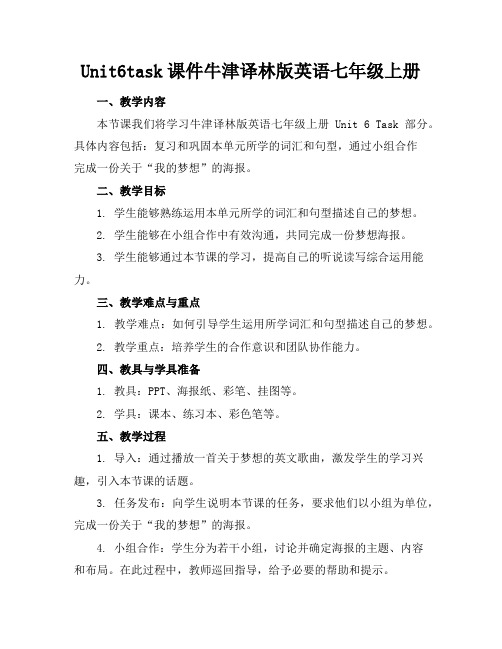
Unit6task课件牛津译林版英语七年级上册一、教学内容本节课我们将学习牛津译林版英语七年级上册Unit 6 Task部分。
具体内容包括:复习和巩固本单元所学的词汇和句型,通过小组合作完成一份关于“我的梦想”的海报。
二、教学目标1. 学生能够熟练运用本单元所学的词汇和句型描述自己的梦想。
2. 学生能够在小组合作中有效沟通,共同完成一份梦想海报。
3. 学生能够通过本节课的学习,提高自己的听说读写综合运用能力。
三、教学难点与重点1. 教学难点:如何引导学生运用所学词汇和句型描述自己的梦想。
2. 教学重点:培养学生的合作意识和团队协作能力。
四、教具与学具准备1. 教具:PPT、海报纸、彩笔、挂图等。
2. 学具:课本、练习本、彩色笔等。
五、教学过程1. 导入:通过播放一首关于梦想的英文歌曲,激发学生的学习兴趣,引入本节课的话题。
3. 任务发布:向学生说明本节课的任务,要求他们以小组为单位,完成一份关于“我的梦想”的海报。
4. 小组合作:学生分为若干小组,讨论并确定海报的主题、内容和布局。
在此过程中,教师巡回指导,给予必要的帮助和提示。
5. 海报展示:各小组展示自己的海报,其他小组进行评价和反馈。
六、板书设计1. Unit 6 Task My Dream2. 主要内容:梦想词汇、梦想句型、海报制作步骤等。
七、作业设计1. 作业题目:以“My Dream”为主题,写一篇短文,描述自己的梦想及实现梦想的理由。
2. 答案示例:八、课后反思及拓展延伸1. 课后反思:本节课通过小组合作完成任务,提高了学生的合作意识和团队协作能力。
但在任务过程中,部分学生存在依赖心理,需要教师进一步引导和关注。
2. 拓展延伸:鼓励学生课后收集更多关于梦想的名言警句,与同学分享,激发彼此的梦想追求。
同时,可以开展一次“我的梦想”演讲比赛,提高学生的英语表达能力。
重点和难点解析1. 教学难点:如何引导学生运用所学词汇和句型描述自己的梦想。
牛津译林版七年级英语上册Unit6Studyskills教学设计

4.教师示范如何制定学习计划,引导学生结合自己的实际情况,制定适合自己的学习计划。
(三)学生小组讨论
1.教师将学生分成小组,每组选择一种学习技巧进行讨论,探讨其在实际学习中的应用和优点。
2.各小组展示讨论成果,其他小组进行评价,提出建议。
3.通过小组讨论,让学生分享自己的学习方法,为新课的学习做好铺垫。
(二)讲授新知
1.教师向学生介绍本节课的核心词汇和短语,如:skimming, scanning, summarizing, note-taking等,并通过例句展示它们在实际语境中的应用。
2.讲解一般现在时描述学习习惯和方法,引导学生运用目标句型进行表达,如:“I often read English articles to improve my reading skills.”。
作业布置要求:
1.作业量适中,避免过多增加学生负担,注重培养学生的自主学习能力和合作精神。
2.作业布置要有针对性,针对不同层次的学生,可适当调整作业难度,使每个学生都能在完成作业的过程中得到提高。
3.作业批改要及时,对学生的作业给予积极评价和反馈,鼓励学生持续进步。
4.鼓励学生主动参与作业,培养他们的责任感和自律性。
2.任务驱动,实践探究:设计丰富多样的课堂任务,引导学生主动探究、合作交流,培养自主学习能力和团队合作精神。
3.分层教学,关注个体差异:针对不同层次的学生,设计不同难度的教学活动,使每个学生都能在原有基础上得到提高。
4.反馈指导,促进反思:教师及时给予学生反馈,指导他们调整学习方法和策略,培养反思意识,提高学习效果。
-引导学生总结、反思自己的学习方法,形成个性化的学习策略。
初中英语七年级上册(牛津译林版)Unit6Studyskills教学设计

2.针对阅读教学:
(1)采用预测、扫读、精读等策略,引导学生逐步提高阅读理解能力。
(2)设计具有针对性的阅读练习,帮助学生把握文章主旨和细节。
(3)鼓励学生进行课外阅读,拓宽知识面,提高阅读兴趣。
3.针对口语教学:
三、教学重难点和教学设想
(一)教学重难点
1.重点:本章节的重点在于学生对描述人物和日常生活的词汇、句型的掌握,以及一般现在时和一般过去时的运用。
难点:学生对于一般过去时的构成和运用容易混淆,同时在阅读过程中,对文章主旨和细节的把握存在困难。
2.重点:培养学生运用阅读策略,提高阅读理解能力。
难点:学生在阅读过程中,如何将所学策略灵活运用,提高阅读效率。
5.结束语:Learning English is not only about memorizing words and sentences, but also about observing and describing the world around us. I hope you can use what you have learned today to communicate with others and improve your English skills.
5.预习作业:预习下一节课的内容,提前了解新词汇和句型,为新课的学习做好准备。
作业要求:
1.请同学们认真完成作业,注意书写规范,保持卷面整洁。
2.家长签字确认,加强对学生学习情况的了解和监督。
3.教师将针对作业完成情况进行检查和评价,鼓励同学们在完成作业的过程中积极思考、主动探究。
(1)创造一个轻松、愉快的课堂氛围,让学生克服紧张情绪,大胆开口说英语。
牛津译林版英语七年级上Unit6 Study skills教学设计(英语教案)
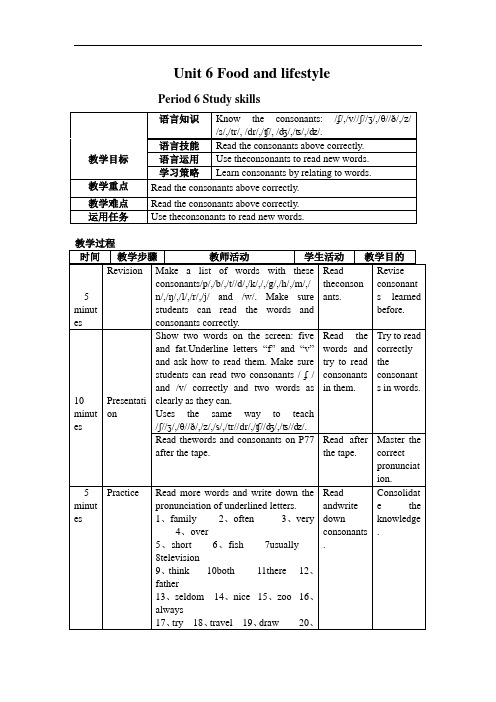
Unit 6 Food and lifestyle Period 6 Study skills课堂检测Reading ComprehensionHealth is more important than money and wisdom(智慧). Good health helps us enjoy our life and get what we need. How can we stay healthy? Here is some helpful advice.Eat more fruit and vegetables. They are full of vitamins(维生素). And they can help us keep healthy and young.Keep a balanced diet and good eating habits. Eat less food with lots of sugar and fat. Eat lots of food high in protein(蛋白质).Exercise every day. Doing sports can help us make our bodies strong.Learn to relax ourselves. Being too tired all the time may make us get sick easily.Give up bad habits, such as drinking and smoking.In a word, if we do this way, we’ll live a healthy life and get fit.1.How many pieces of advice does the writer give us?________________________________________________________________2.What does the writer think of health?________________________________________________________________3.If your body needs vitamins, what should you eat?________________________________________________________________4.Why do we need to exercise every day?________________________________________________________________5.If you want to get a balanced diet, what food should you eat often?_________________________________________________________________1.Five.2.Health is more important than money and wisdom.3.Fruit and vegetables.4.Doing sports can help us make our bodies strong.5.Food high in protein.。
牛津译林版七年级上册英语《Unit 6 Food and lifestyle Study skil》课件公开课
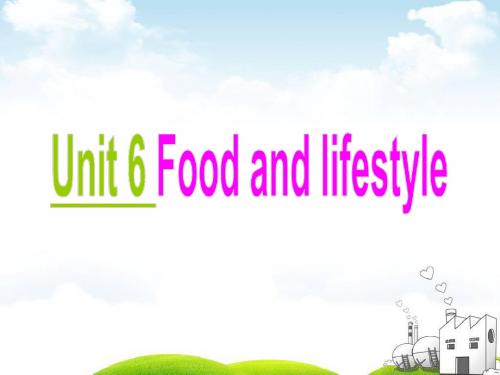
Listening (听词辩音,红色字母发音相同S不同D)
1 wait visit 2 thing sing 3 just juice 4 light night D 7 wash watch D 8 chair shout 9 tree driver D D
D S
D
10 nurse nose D 11 coats cards D
Thank you
无论是晴天或是阴天。 无论是冷或是暖, 不管喜欢与否,我们都要经受风霜雨露。
Practice makes perfect
熟能生巧
1. Practice reading the sentences
and the consonants.
2.Finish the exercises in the book.
正确流利读出含有本课所学辅音单词的句子
Practice in groups (2 minutes)
1.组长利用音标卡,练习并检查组员
2.检查完毕,请坐下
Rush Reading (抢读音标)
Challenge yourself (挑战自我)
Listening (听单词辨读音)
1 2 3 4 5 6 7 8
Whether the weather be fine or whether the weather be not.
Whether the weather be cold or whether the weather be hot. We'll weather the weather whether we like it or not.
Objectives 教学目标
1.To know more consonants
译林牛津版七年级英语上 unit 6 公开课教学课件 (共26张PPT)
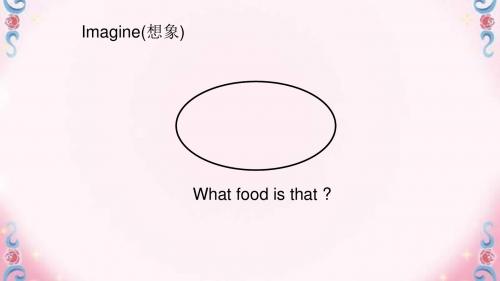
Memory(记忆力)
Word puzzle(字谜)
Find as many words of food and drinks as you can!
TIP: They are in lines!
h amb u r g e r
i b o hw i f n e
Who has a healthy lifestyle? Who needs to change?
Kitty
Hi! My name is Kitty. I love dancing. I dance for half an hour every day.
Healthy food is important for me. I need to keep fit. I always have milk and bread for breakfast. For lunch and dinner, I usually eat fish and vegetables.
Work in groups.
Useful expressions
A healthy menu:
A healthy lifestyle:
have…for breakfast/ lunch/ dinner have…between meals need to eat more… never eat…because…
I seldom eat _c_a_k_e_s__ or __s_w_e_e_t_s__.
I love _h_a_m_b__u_rg_e_r_s_ and _c_o_l_a_.
My favourite meat is __b_e_e_f__.
译林牛津版七年级英语上 unit 6公开课教学课件 (共36张PPT)

not healthy unhealthy
fat
Is she healthy?
Is he healthy?
Are they healthy?
He is too fat !
Unhealthy food Their lifestyle
Junk food
(垃圾食品)
Breakfast: nothing
Read and find.
n. 健康
be good for… 对……有好处
翻译:做早操对我们的身体有好处。
e.g: D_o_i_ng__ morning exercises__i_s __ _g_oo_d__ ___fo_r_our_h_ea_lt_h_.
Dicuss and make up new dialgues.
should have an __ap_p_l_e__, because an apple a day _k_e_e_p_s__ the doctor away. Eddie
agrees, but he needs __te_n____.
Does Eddie have
a healthy diet?
give … energy(能量) help … grow well have too much sugar/ fat(脂肪)/ oil(油)
We think … is/are good for our health because …
We think … is/are bad for our health because …
[swi:t] [mi:t] [bi:f] [snæ k] [pɔ:k]
[‘kæ rət] [‘lemən] [‘tʃɔklət] [‘wɔ:təmelən]
牛津译林版七年级上册英语全册教案Unit6Studyskills
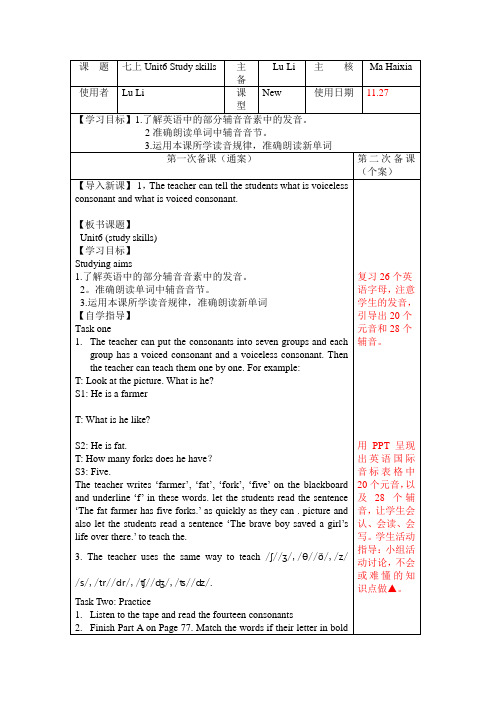
1. Remember thevowel lettersby heart.
2.Previewtask
教学反思
得:鼓励不同层次的学生主动向大家展示,教师要及时纠正和表扬
失:让学生标记出重难点,以便及时复习
改:多做练习。
1. court
2. swim
3.badminton4.volleyball
5.swimming pool6.football field
复习26个英语字母,注意学生的发音,引导出20个元音和28个辅音。
用PPT呈现出英语国际音标表格中20个元音,以及28个辅音,让学生会认、会读、会写。学生活动指导:小组活动讨论,不会或难懂的知识点做▲。
【板书课题】
Unit6 (study skills)
【学习目标】
Studying aims
1.了解英语中的部分辅音音素中的发音。
2。准确朗读单词中辅音音节。
3.运用本课所学读音规律,准确朗读新单词
【自学指导】
Task one
1.The teacher can put the consonants into seven groups and each group has a voiced consonant and a voiceless consonant. Then the teacher can teach them one by one. For example:
T: Look at the picture. What is he?
S1: He is a farmer
T: What is he like?
S2: He is fat.
T: How many forks does he have?
牛津译林版英语七年级上册Unit6教案说课稿

(一)学生特点
本节课面向的是七年级学生,这个年龄段的学生正处于青春期初期,好奇心强,活泼好动,善于模仿,对新鲜事物充满兴趣。在认知水平上,他们已经具备了一定的词汇量和语法基础,能够进行简单的英语交流。然而,他们的注意力容易分散,对复杂知识点的理解和记忆可能存在困难。在学习兴趣方面,他们更喜欢互动性强、富有创意的学习活动。此外,部分学生的学习习惯尚未完全形成,需要教师在教学中予以引导和培养。
(五)作业布置
课后作业布置如下:
1.复习本节课所学的家庭成员词汇和句型,完成课后练习题。
2.结合自己的生活实际,用英语写一篇关于自己家庭成员的短文,要求使用一般现在时和形容词性物主代词。
3.收集一些家庭主题的英文歌曲、故事或电影,与同学分享。
作业的目的是巩固所学知识,提高学生的语言运用能力,并拓宽他们的文化视野。通过以上教学过程设计,使学生在轻松愉快的氛围中学习英语,提高他们的英语素养。
1.使用不同颜色的粉笔,突出重点和难点。
2.保持字体大小适中,书写工整。
3.在适当的位置使用箭头、框线等符号,表明知识点之间的逻辑关系。
4.在板书过程中,适时擦除非重点内容,保持板书的简洁性。
(二)教学反思
在教学过程中,我预见到以下可能的问题或挑战:
1.部分学生对一般现在时和形容词性物主代词的掌握可能不够牢固。
2.课堂互动中可能出现时间分配不合理的情况。
3.学生在小组活动中的参与度可能不均衡。
为应对这些问题,我将:
1.在课堂上增加对重点知识点的讲解和练习。
2.灵活调整课堂节奏,确保每个环节都有足够的时间进行深入讨论。
3.对小组活动进行合理分组,鼓励每个学生积极参与。
课后,我将通过以下方式评估教学效果:
(牛津译林版)七年级英语上册教学课件:Unit 6 Study Skills1
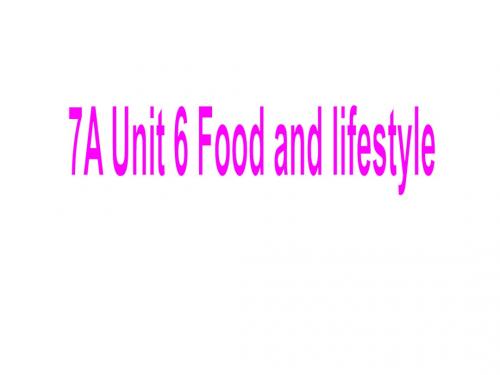
wish
change
together
thing
there
show
drink watch health
Read the pairs of words below. Write S in the box if the letters in colour of a pair have the same sound. Write D if they do not.
Step 2 What do you have for breakfast? Can you give any reasons?
Step 3 What do you have for lunch? Can you give any reasons?
Step 4 What do you have for dinner? Can you give any reasons?
Name/ Age Hobbies Breakfast/Reason Lunch/ Reason Dinner/Reason
Step 1 List the names of food, fruits and drinks.
Fruits
Fast food Vegetables
Snacks
Meat
Main food
1 wait visit
D
2 thing sing
S
3 just juice
S
4 light night
D
5 mouth mother D
6 thin think
S
7 wash watch
D
8 chair shoutDΒιβλιοθήκη 9 tree driver
- 1、下载文档前请自行甄别文档内容的完整性,平台不提供额外的编辑、内容补充、找答案等附加服务。
- 2、"仅部分预览"的文档,不可在线预览部分如存在完整性等问题,可反馈申请退款(可完整预览的文档不适用该条件!)。
- 3、如文档侵犯您的权益,请联系客服反馈,我们会尽快为您处理(人工客服工作时间:9:00-18:30)。
Fruits
Vegetables
Fast food
Main food Snacks Meat
Step 2 What do you have for breakfast ?
Can you give any reasons? Step 3 What do you have for lunch?
Can you give any reasons?
Read Simon’s article, then answer the questions. 1. How does Simon keep fit? He often plays football to keep fit. 2. What does Simon have for breakfast? He has an egg. He also eats baozi or mantou. He also drinks a glass of milk.
Step 4 What do you have for dinner? Can you give any reasons? Step 5 Write your own article. You can use the useful expressions on P78 to help you write the article.
You want to worry about your lifestyle. Fill in the following blanks. Name/ Age Hobbies Breakfast/Reason
Lunch/ Reason
Dinner/Reason
Step 1 List the names of food, fruits and drinks.
zoo
try
always
travel
/z/
/tr/ /dr/
/ / / /
draw
children just
dream
match geography
starts
reads
sports
friends
/ts/ /dz/
Read the pairs of words below. Write S in the box if the letters in colour of a pair have the same sound. Write D if they do not.
D D D
12
shoe
shop
S
Practise saying the following sentences.
1. She sells seashells by the seashore. 2. There are three toy trains in the tree. 3. One hundred children have one hundred dreams. 4. The schoolboys on the bus are my classmates.
Step 6 Read articles and discuss whether
your diet is healthy or not.
1 wait 2 thing 3 just 4 light
visit sing juice night
D S
S
D
5 mouth 6 thin 7 wash
mother think watch
D
S D
8 chair
shout
D
9 10 11
tree nurse coats
driver nose cards
Consonants
Listen and repeat, find out the rules.
family often /f/ /v/ / / / /
very
short
over
fish
பைடு நூலகம்
usually television
think
there
both
father
/ / / /
/s/
seldom
nice
3. Does Simon eat fish or vegetables for
lunch? No, he doesn’t. 4. How often does Simon eat fruit?
Every day.
5. Does Simon drink lots of water every
day? Yes, he does.
